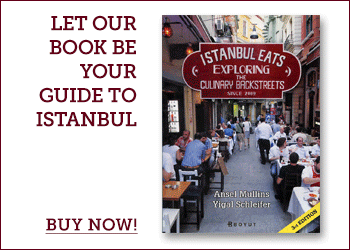Friday
WineSupermarket Cellars: Talay Tenedos Red
 (Editor’s Note: This is the third installment of our newest feature, “Supermarket Cellars,” which aims to uncover those drinkable Turkish wines that won’t kill your budget or, let’s face it, you. In charge of this mission is Aaron Stein – an expert on nuclear non-proliferation issues and PhD student by day, avid wine drinker and enthusiast by night — who has been assigned the thankless task of scouring the low-end of Istanbul’s wine department shelves for budget-friendly diamonds in the rough. We plan on featuring his discoveries on a regular basis for as long as he can survive this hazardous assignment.)
(Editor’s Note: This is the third installment of our newest feature, “Supermarket Cellars,” which aims to uncover those drinkable Turkish wines that won’t kill your budget or, let’s face it, you. In charge of this mission is Aaron Stein – an expert on nuclear non-proliferation issues and PhD student by day, avid wine drinker and enthusiast by night — who has been assigned the thankless task of scouring the low-end of Istanbul’s wine department shelves for budget-friendly diamonds in the rough. We plan on featuring his discoveries on a regular basis for as long as he can survive this hazardous assignment.)
Intent on breaking the monotony of my local supermarket’s Doluca filled shelves, I took a trip to Sensus – an upmarket wine bar nestled in the shadow of the Galata Tower that specializes in Turkish wines and cheeses – to find some new local gems under 30 TL.
After scouring the aisles for some of the more low-priced options, I eventually settled on a bottle from Talay, a blend of Cabernet Sauvignon and Kuntra from Bozcaada (also known by its Greek name, Tenedos), an island in the northern Aegean regarded as one of Turkey’s best wine regions. Bozcaada has a history of invasion, numerous cultures and a number of different rulers including the ancient Greeks, the Persian Empire, the Ottomans and, most recently, the Turkish Republic. Through all of this, wine has always been a part of the island’s history and culture. More recently, though, private Turkish companies have worked to improve the quality, which appears to have been in slow but steady decline since the days of Homer.
Talay is a large, privately owned Bozcaada winery specializing in producing wine from grapes typical of the island and the nearby Çanakkale (Gallipoli) region. I had never heard of the Kuntra grape (also known as Karaksız), so I had to do some Googling to figure out the grape’s origins, typical use and normal flavor profile. According to the few articles written, Kuntra is a sweet grape used primarily for making dessert wine, distillation and the production of Turkish cognac (who knew that existed?). The sugary grape yields a more alcoholic wine than the typical European varietal, which, depending on your wine-drinking intent, could be seen as either a positive or negative.
The winemakers paired the indigenous and sweet Kuntra with the more robust and familiar Cabernet Sauvignon, resulting in a wine that has a dark cherry color and a very fruity bouquet. The nose leads with red fruit and finishes with a hint of stone and minerals. This unusual blend yields a wine that is surprisingly delicate, soft and well-balanced, leading with a taste of strawberry and red fruits, laced with slightly citrusy notes, before finishing with the taste of black pepper.
Considering how delicate this wine is, it would be overpowered by garlic heavy dishes. I would recommend pairing it with simple red meat dishes, roast chicken or a hard, mild cheese. The wine would work well as an after-brunch option for those lazy Sundays spent relaxing with friends, or as a beverage of choice for picnic lovers (or lovers on a picnic).
Related Posts
Post Tags: Turkish wine








Apr 6, 2012
Reply
Thank you for the Homeric enologic odyssey. As I am a fan of strawberries and black pepper, I will take your recommendation. You have been spot on so far. I look forward to future reviews.
Reggie
Apr 7, 2012
Reply
I am also surprised by the Turkish ccgnac! What would you call a Brandy Alexander made with Turkish cognac??
Frieda K.
Apr 21, 2012
Reply
Where is the hard mild cheese in Istanbul? Do tell…
P.S- I am still looking for my 25TL Kav (tried the MMigros in Beşiktaş to no avail, thoughts?)
Thanks!
Nora